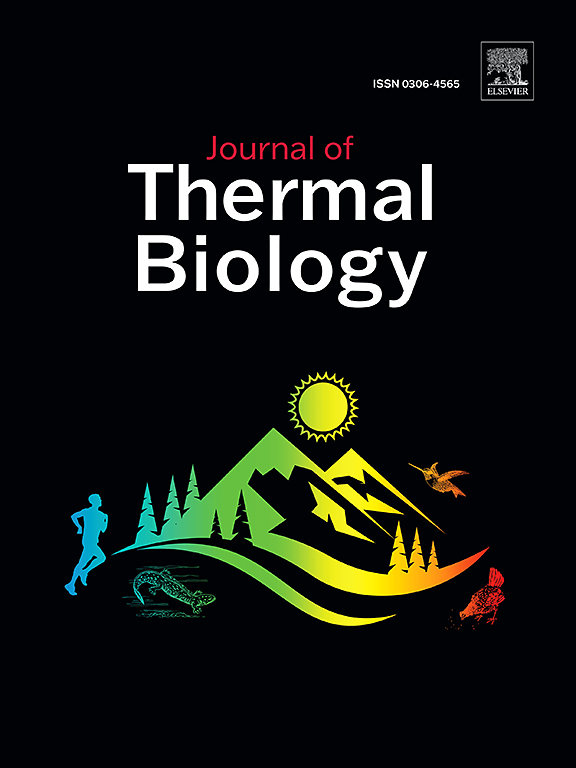Dilation of the distal convoluted tubule induced by repeated heat exposure in rats model
IF 2.9
2区 生物学
Q2 BIOLOGY
引用次数: 0
Abstract
Thermal therapy (TT) has developed as a nonpharmacological strategy for various diseases, but little is known about its impact on the kidneys. This study conducted an animal experiment to elucidate this impact. We randomized 12 rats to control and TT groups and subjected them to 24 °C and 41 °C, respectively, once a day for four weeks. We monitored blood component changes weekly and examined rat kidneys pathologically after the trial. Cutaneous flux and renal blood flow were assessed before and during the intervention. The cross-sectional area of the distal convoluted tubule (DCT) significantly increased in the TT group compared to the control group (P < 0.001). The TT group's DCT showed an average perimeter elongation of 75.9 %, which is explained by mechanical strain and the proliferation of epithelial cells. Significant increases at 14 days (P < 0.05) in blood urea nitrogen, creatinine, and uric acid levels indicated that renal damage was the cause of these occurrences. Furthermore, this damage is caused by thermally induced renal ischemia, as indicated by a 21.3 % decrease in mean blood flow in the renal artery, which was also evidenced by a 65.2 % increase in mean cutaneous flux and a significant rise in red blood cell count (P < 0.05). Sirius red staining showed that there was no difference in fiber expression between the two groups. Although no progression of renal fibrosis was observed, repeated heat exposure could induce the dilation of DCT. These findings may guide the redesign of TT protocols for patients and recreational users.
反复热暴露致大鼠远曲小管扩张模型。
热疗(TT)已发展成为一种非药物治疗多种疾病的策略,但对其对肾脏的影响知之甚少。本研究通过动物实验来阐明这种影响。我们将12只大鼠随机分为对照组和TT组,分别给予24℃和41℃的低温处理,每天1次,连续4周。我们每周监测血液成分变化,并在试验后对大鼠肾脏进行病理检查。在干预前和干预期间评估皮肤通量和肾血流量。与对照组相比,TT组远曲小管(DCT)的横截面积显著增加(P
本文章由计算机程序翻译,如有差异,请以英文原文为准。
求助全文
约1分钟内获得全文
求助全文
来源期刊

Journal of thermal biology
生物-动物学
CiteScore
5.30
自引率
7.40%
发文量
196
审稿时长
14.5 weeks
期刊介绍:
The Journal of Thermal Biology publishes articles that advance our knowledge on the ways and mechanisms through which temperature affects man and animals. This includes studies of their responses to these effects and on the ecological consequences. Directly relevant to this theme are:
• The mechanisms of thermal limitation, heat and cold injury, and the resistance of organisms to extremes of temperature
• The mechanisms involved in acclimation, acclimatization and evolutionary adaptation to temperature
• Mechanisms underlying the patterns of hibernation, torpor, dormancy, aestivation and diapause
• Effects of temperature on reproduction and development, growth, ageing and life-span
• Studies on modelling heat transfer between organisms and their environment
• The contributions of temperature to effects of climate change on animal species and man
• Studies of conservation biology and physiology related to temperature
• Behavioural and physiological regulation of body temperature including its pathophysiology and fever
• Medical applications of hypo- and hyperthermia
Article types:
• Original articles
• Review articles
 求助内容:
求助内容: 应助结果提醒方式:
应助结果提醒方式:


